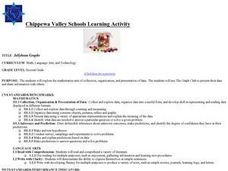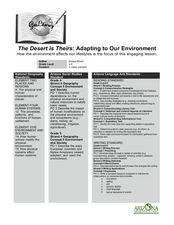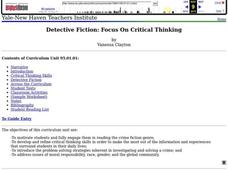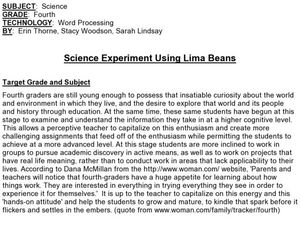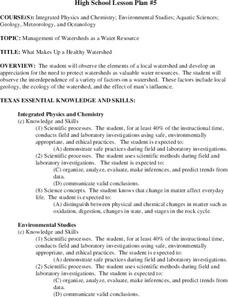Reed Novel Studies
Three Times Lucky: Novel Study
A car crash, a murder, a hurricane. With such a plot, why is the title of Sheila Turnage's novel Three Times Lucky? After making a prediction about the plot, scholars use the novel study to research and record facts...
Reed Novel Studies
Tales of a Fourth Grade Nothing: Novel Study
Many turtle species can retreat their heads into their shells when threatened by predators. With the Tales of a Fourth Grade Nothing novel study, pupils conduct research to uncover other interesting turtle facts. As they explore Judy...
Curated OER
Jellybean Graphs
Second graders predict and graph data based on the color of jelly beans they think are in a handful. In this prediction lesson plan, 2nd graders will predict how many of each color jellybean are in a handful. Then they graph these...
Curated OER
Things Aren't Always What They Seem
Students use video and the Internet to make predictions, draw conclusions, determine conflict and point of view while reading a short story. In this short story analysis lesson, students watch a related video and complete a prediction...
Curated OER
Decision Making
Students study weather patterns and learn to make decisions based on the weather. In this weather lesson, students plan a potluck based on the weather. Students use a decision tree to brainstorm about the activity. Students complete a...
NOAA
Off Base
How does carbon dioxide affect the world's oceans? The final installment in a series of six lessons has pupils research ocean acidification, then conduct an experiment to witness the delicate balance that exists in our seas. Materials...
Curated OER
Why Predict?
Twelfth graders examine the process of predicting. They observe a fine art transparency, discuss their predictions about the artwork, identify the types of predictions made during a weather broadcast, and evaluate headlines from...
Curated OER
Using Wordless Comics To Help Create Meaning in Reading
Use picture cues as a tool in order to create meaning along with text. With a wordless comic, young illustrators discuss the main idea and character traits, and independently write a summary for a page of a wordless comic. This strategy...
Curated OER
Can't You Make Them Behave, King George?
Fifth graders describe the changes in King George III's policy toward the American colonies by sequencing key events between the French and Indian War and the American Revolution. They explain the colonial reactions to command decisions...
Curated OER
The Desert is Theirs: Adapting to Our Environment
Students determine how animals and people adapt to the desert environment. In this desert lesson, students review vocabulary about the desert and how humans have to make changes to accommodate their environments. They listen to and...
Curated OER
Migrating to Texas
Fourth graders explore the migration to Texas from other parts of the United States. Through journal entries they write about the trip as if they were the settlers coming to a new and foreign country. Working in small groups, 4th graders...
California Academy of Science
Human Evolution
As the great and hilarious Tim Minchin once said, "Science is simply the word we use to describe a method of organizing our curiosity." Science is more than just a guess; it is based on questions, observations, and evidence. High...
Curated OER
In Touch with Apples
Students read "How To Make an Apple Pie and See the World", the story of a girl who traveled the world to find the ingredients to make her apple pie. They conduct a series of interdisciplinary activities including testing their senses,...
Curated OER
Detective Fiction: Focus On Critical Thinking
Turn your 6th graders into detectives while growing their love of reading. Using critical thinking skills, they will be able to describe the five basic elements of detective fiction, read detective novels, make predictions, use the...
Curated OER
Go To The Head of the Cloud
Students pretend they are water droplets traveling through the water cycle. Using their text, they discover the steps in the cycle and the different paths water can take. They write a report about their journey through the water cycle...
Curated OER
Science Experiment Using Lima Beans
Fourth graders tie together elements about the world and their environment. Students incorporate styles of higher order thinking skills. Students measure skills of observations, conclusions, inferences and predictions.
Curated OER
Night of the Twister
Young scholars use reading strategies for Night of the Twister. In this reading strategies instructional activity, students name five major catastrophes and books about each. Young scholars complete a vocabulary section, make inferences...
Curated OER
Magazine Madness
Young scholars look at pictures cut out of magazines to determine what is happening in the picture and predict what will happen next.
Curated OER
What Makes Up a Healthy Watershed
Students, after observing the elements of a local watershed, explore the need to protect watersheds as water resources for the future. They examine the factors involved with a watershed: geology, ecology, and the effect of man's...
Curated OER
Esperanza Rising-Inferences
Sixth graders make inferences while reading. For this inferences lesson, 6th graders read Esperanza Rising and ask questions about the text.
Curated OER
WEATHER SATELLITE PREDICTION PROJECT
Young scholars compile weather satellite data from three satellites for one month, obtain weather reports and data from professionals, then create a document with predicted results.
NASA
Let's Investigate Mars
Take your science class on a hypothetical field trip to Mars with an engaging astronomy lesson. After first learning about NASA's Mars rover missions, young scientists plan their own scientific investigations of Earth's...
Curated OER
Ornithology and Real World Science
Double click that mouse because you just found an amazing instructional activity! This cross-curricular Ornithology instructional activity incorporates literature, writing, reading informational text, data collection, scientific inquiry,...
Curated OER
Cattle Drive
Students explore cattle drives. For this United States history and letter writing lesson, students write a letter to their family predicting possible problems that were encountered by participants in cattle drives. Students design...

